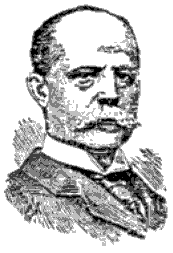Edward Lawrence Keyes
Edward Lawrence Keyes (1843–1924) was a prominent American urologist and a pioneer in the field of urology. He made significant contributions to the understanding and treatment of urological diseases, particularly in the areas of syphilis and prostate conditions.
Early Life and Education[edit | edit source]
Edward Lawrence Keyes was born in 1843. He pursued his medical education at the College of Physicians and Surgeons in New York City, where he graduated in 1865. Following his graduation, Keyes continued his studies in Europe, where he trained under some of the leading medical practitioners of the time.
Career[edit | edit source]
Upon returning to the United States, Keyes began his medical practice in New York City. He quickly established himself as a leading expert in the field of urology. Keyes was known for his innovative approaches to the diagnosis and treatment of urological conditions.
Contributions to Urology[edit | edit source]
Keyes made several notable contributions to urology, including advancements in the treatment of syphilis. He developed the "Keyes' operation," a surgical procedure for the treatment of prostate conditions. His work in the field of venereal diseases was highly regarded, and he authored several influential texts on the subject.
Academic and Professional Involvement[edit | edit source]
Keyes was a professor of genitourinary surgery at the Bellevue Hospital Medical College and later at the New York University School of Medicine. He was also a founding member of the American Urological Association and served as its president.
Personal Life[edit | edit source]
Edward Lawrence Keyes was married and had children. He was known for his dedication to his family and his profession. Keyes passed away in 1924, leaving behind a legacy of significant contributions to the field of urology.
Legacy[edit | edit source]
Keyes' work laid the foundation for modern urology. His innovative techniques and dedication to the field have had a lasting impact on the treatment of urological diseases. The "Keyes' operation" remains a notable part of his legacy.
See Also[edit | edit source]
- Urology
- Syphilis
- Prostate
- American Urological Association
- Bellevue Hospital Medical College
- New York University School of Medicine
References[edit | edit source]
External Links[edit | edit source]
Search WikiMD
Ad.Tired of being Overweight? Try W8MD's physician weight loss program.
Semaglutide (Ozempic / Wegovy and Tirzepatide (Mounjaro / Zepbound) available.
Advertise on WikiMD
|
WikiMD's Wellness Encyclopedia |
| Let Food Be Thy Medicine Medicine Thy Food - Hippocrates |
Translate this page: - East Asian
中文,
日本,
한국어,
South Asian
हिन्दी,
தமிழ்,
తెలుగు,
Urdu,
ಕನ್ನಡ,
Southeast Asian
Indonesian,
Vietnamese,
Thai,
မြန်မာဘာသာ,
বাংলা
European
español,
Deutsch,
français,
Greek,
português do Brasil,
polski,
română,
русский,
Nederlands,
norsk,
svenska,
suomi,
Italian
Middle Eastern & African
عربى,
Turkish,
Persian,
Hebrew,
Afrikaans,
isiZulu,
Kiswahili,
Other
Bulgarian,
Hungarian,
Czech,
Swedish,
മലയാളം,
मराठी,
ਪੰਜਾਬੀ,
ગુજરાતી,
Portuguese,
Ukrainian
Medical Disclaimer: WikiMD is not a substitute for professional medical advice. The information on WikiMD is provided as an information resource only, may be incorrect, outdated or misleading, and is not to be used or relied on for any diagnostic or treatment purposes. Please consult your health care provider before making any healthcare decisions or for guidance about a specific medical condition. WikiMD expressly disclaims responsibility, and shall have no liability, for any damages, loss, injury, or liability whatsoever suffered as a result of your reliance on the information contained in this site. By visiting this site you agree to the foregoing terms and conditions, which may from time to time be changed or supplemented by WikiMD. If you do not agree to the foregoing terms and conditions, you should not enter or use this site. See full disclaimer.
Credits:Most images are courtesy of Wikimedia commons, and templates Wikipedia, licensed under CC BY SA or similar.
Contributors: Prab R. Tumpati, MD

